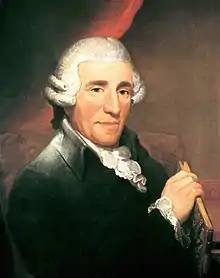
The Symphony No. 51 in B♭ major, Hoboken I/51, is a symphony by Joseph Haydn, written in either 1773 or 1774,[1] although the exact dating remains ambiguous.[2]
Scored for 2 oboes, 2 horns (B♭ alto, E♭), bassoon and strings. The work is in four movements:
Sometimes described as "a concertante piece featuring the two horns, which are given parts of staggering difficulty."[3] The second, slow, movement contains high notes for the first horn (including a written F6 for horn in E♭) and very low notes for the second horn.[4] The third movement contains an even higher note for horn, a written C6 for horn in B♭ alto (sounding as B♭5), one of the highest notes ever written for horn. Heartz has noted the character of the fourth movement as reminiscent of the French rondeau.[2] The first contrasting section is an oboe solo in E♭ major and the second contrasting section is fortissimo and in G minor.[4]
References
- ↑ James Webster & Georg Feder, The New Grove Haydn. New York: Macmillan (2002): 64. Haydn's symphonies of the years around 1770 ... are widely described as exemplifying his Sturm und Drang style; those of 1773–4 (nos.50, 51, 54–7, 60, 64), while less extreme, have many points of contact with it."
- 1 2 Daniel Heartz, Haydn, Mozart, and the Viennese School, 1740–1780. W.W. Norton & Company (ISBN 0393965333), pp. 363-364 (1995).
- ↑ Antony Hodgson, The Music of Joseph Haydn: The Symphonies. London: The Tantivy Press (1976): 78
- 1 2 H. C. Robbins Landon, Haydn: Chronicle and Works, 5 vols, (Bloomington and London: Indiana University Press, 1976– ) v. 2, Haydn at Eszterhaza, 1766–1790..